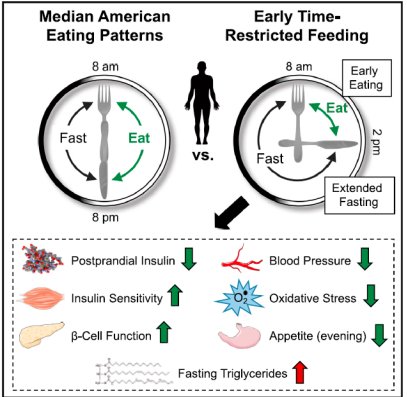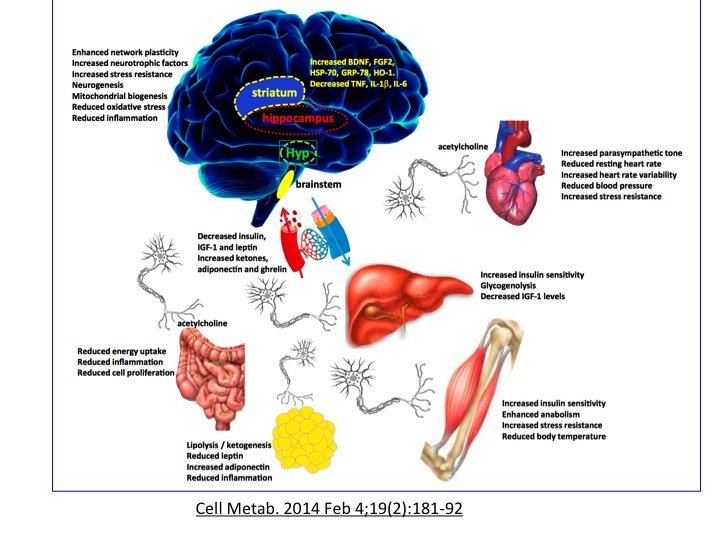We include products in articles we think are useful for our readers. If you buy products or services through links on our website, we may earn a small commission.
Everything You Need to Know About the 72 Hour Fast

Fasting is an age-old tradition that has been practiced across cultures for both physical and spiritual reasons. In recent years, people have been exploring both short-term and long-term fasts for their significant health benefits ranging from weight loss, to reduced inflammation, and improved brain function.
Multi-day fasts in particular have been gaining recognition for their ability to ramp cellular renewal (autophagy) and the expression of beneficial hormones. The 72-hour fast is a three-day fast that has been linked to protection against neurodegenerative diseases like Alzheimer’s and Multiple Sclerosis.
In this article, we’ll take a deeper look at the 72-hour fast, from preparation to a more in-depth analysis of its health benefits.
Table of Contents
What is the 72 Hour Fast?
When we fast, we are abstaining from food and all caloric beverages over a specific amount of time. Different metabolic processes are activated depending on the length of your fast.
Many people start their fasting journey with intermittent fasting as a way to orient their bodies to a fasting and feasting cycle similar to our ancestral eating patterns.
Typically, people work their way up the intensity scale from Time Restricted Eating, to 16 and 18 hours fasts for at least a few days. Then they graduate to a full 24 hour fast, and progress further to 36 hours or 48 hours.
In shorter fasts, your body’s metabolism remains focused on converting nutrients into tissue growth. But during a prolonged fast, your body begins to convert larger molecules, specifically glycogen (stored glucose in the liver and muscles) and stored fat (triglycerides) into energy molecules for various bodily functions.
This metabolic switch to breaking down fatty acids as an energy source is the foundation of ketosis, which offers numerous powerful benefits.
Some of the health benefits of the 72 hour fast include:
- Cellular renewal and regeneration (autophagy)
- Reduced body fat
- Reduced inflammation
- Improved cognitive function
1. Autophagy
Autophagy, meaning “self-eating,” is the body’s natural process of cellular renewal. Damaged and dysfunctional cells are removed or recycled in order to regenerate newer and healthier cells.
This self-preservation system helps the body fight infectious diseases from viruses and harmful bacteria, and combat cancer. It can be induced by fasting, calorie restriction, and exercise.
Dysregulated autophagy has been linked to a growing number of diseases. Fasting for up to 72 hours fully engages the process of autophagy and cellular homeostasis, helping the body rid itself of dysfunctional or dead cells and regenerate at a faster speed.
2. Weight Loss
The 72 hour fast helps reduce body fat while maintaining lean muscle mass through the process of ketosis.
During a 3 day fast, insulin levels drop and your body begins to turn stored fatty acids into energy molecules called ketones.
One study found that during a 3 day fast, metabolic rate rises by 14%. This increase in metabolic rate means that your body is burning calories even while you’re at rest, effectively increasing the potential for weight loss.
Other studies have found that though long-term fasting can slow down metabolic rate, short-term (intermittent to 3 days) fasting can actually increase your metabolism.
3. Reduced Inflammation
There are two types of inflammation that occur in the body. Acute inflammation is the body’s biological defense mechanism against infection or injury, triggering the immune system to release white blood cells that surround and fight off harmful agents (antigens) and protect the body against further harm.
Chronic inflammation is when the body’s natural inflammatory response lasts can’t turn off, and lasts for several months to years. The immune system continues to perceive the body as under attack and continues to send white blood cells to the threatened areas.
The overconsumption of high-carb processed foods, plant toxins, emotional stress, and lack of physical movement can all contribute to prolonged inflammation in the body.
Studies have shown that chronic inflammation is linked to heart disease, diabetes, cancer, arthritis, and digestive tract disorders like Crohn’s disease and ulcerative colitis.
According to the World Health Organization (WHO), more people are killed by diseases related to chronic inflammation than any other factor. Globally, 3 out of 5 people are killed due to chronic inflammatory diseases such as stroke, chronic respiratory diseases, heart disorders, cancer, obesity, and diabetes.
Ok, now for the good news!
Fasting has been shown to initiate several revitalizing processes that reduce inflammation in the body.
A 72-hour fast realigns our metabolism with the biological fasting cycles that humans evolved on.
This realignment regulates inflammatory responses by appropriately turning off inflammatory cells (that would be activated by food intake and related hormone secretions) and activating autophagy–the process of cellular regeneration and renewal that we described above.

Source: Elizabeth F. Sutton, Robbie Beyl, Kate S. Early, William T. Cefalu, Eric Ravussin, Courtney M. Peterson, Early Time-Restricted Feeding Improves Insulin Sensitivity, Blood Pressure, and Oxidative Stress Even without Weight Loss in Men with Prediabetes, Cell Metabolism, Volume 27, Issue 6, 2018,
According to one study, fasting reduces the risk of highly inflammatory immune cells called monocytes. Scientists have observed increasing monocytes in blood circulation in recent populations due to eating habits.
When we fast, we are essentially putting these monocytes into “sleep mode” without compromising their emergency mobilization during tissue repair and acute infectious mobilization.

Source: Jordan S, Tung N, Casanova-Acebes M, et al. Dietary Intake Regulates the Circulating Inflammatory Monocyte Pool. Cell. 2019
4. Cognitive Improvement and Protection
A 72 Hour fast can protect and improve cognitive function through various factors including.
- Reduced body weight and increased blood flow to the brain
- Activating neuropathways associated with growing and maintaining brain cells
- Activating autophagy–a process of cellular regeneration that improves the health of brain cells
- Reduced inflammation
- Reducing the brain’s exposure to elevated blood sugar and the cascading effects of insulin and leptin resistance
- Aligning your eating patterns with circadian metabolic rhythms that naturally support brain function
When considering the combination of all of these factors, it’s likely that Intermittent fasting is one of the most powerful lifestyle approaches to supporting brain function.
BDNF
One way is by stimulating the production of a hormone called Brain Derived Neurotrophic Factor (BDNF). This vital growth factor promotes neurogenesis–the growth and development of brain tissue, and neuroplasticity, which is the ability of the brain to form synaptic connections. Both of these processes are essential for learning and memory. BDNF also has a vital impact on energy homeostasis.
Decreased levels of BDNF are linked to neural disorders such as Alzheimer’s, multiple sclerosis, and Parkinson’s.
According to one animal study, fasting promoted an increase in BDNF, regulated glucose, and increased levels of serotonin and dopamine in the brain. These results are correlated with reduced instances of depression, anxiety, and neurodegenerative diseases.
Ketones
A 72 hour fast compels your body to break down body fat into ketone energy molecules through butanoate metabolism, pyruvate metabolism, and glycolysis and gluconeogenesis. Each of these metabolic pathways has been found to be neuroprotective.
In one study looking at the effects of fasting on men with mild cognitive impairment, researchers found that “Overall, the MCI-afflicted older adults who practiced IF regularly had better cognitive scores and reverted to better cognitive function at 36 months follow-up.”
An animal study from 2021 revealed that Intermittent fasting enhances long-term memory consolidation and neurogenesis of the hippocampus while increasing the expression of the “Klotho” gene, which is closely linked with longevity.”

How to Prepare for a Safe 72-Hour Fast
Fasting may not be the right fit for everyone. It’s recommended to start with intermittent fasting and then work your way up to longer fasts.
If you follow a low-carb, high-fat diet, you’ll have a head start since your body will already be accustomed to metabolizing body fat into energy.
Eating animal-based whole foods for at least three days in advance will help nourish your body with vital minerals and nutrients that will support your fasting journey.
This includes maintaining a nutrient-dense, low-carb diet that will help replenish your body with healthy animal fats and bioavailable micronutrients both before and after the fasting period.
Hydration is also very important during prep and for the duration of the fast.
Here’s a list of beverages you can drink while fasting:
- Water
- Mineral Water
- Sparkling water
- Coffee (no sugar, milk, or other additives)
- Tea (green or black. No milk, or other additives)
Bottom Line
The 72 hour fast has been shown to improve cognition, reduce inflammation, control blood sugar, and help manage weight loss.
During longer fasts, processes like autophagy and ketosis are at their peak, supporting the removal of dysfunctional cells and making way for newer, healthier cells fed by powerful energy molecules called ketones.
The modern American diet, characterized by near-constant consumption of carbohydrates, plant foods, and processed foods, is the root of chronic inflammation and disease.
With smart preparation, the 72 hour fast can help prevent inflammatory disorders and revitalize the body’s metabolic processes.





















